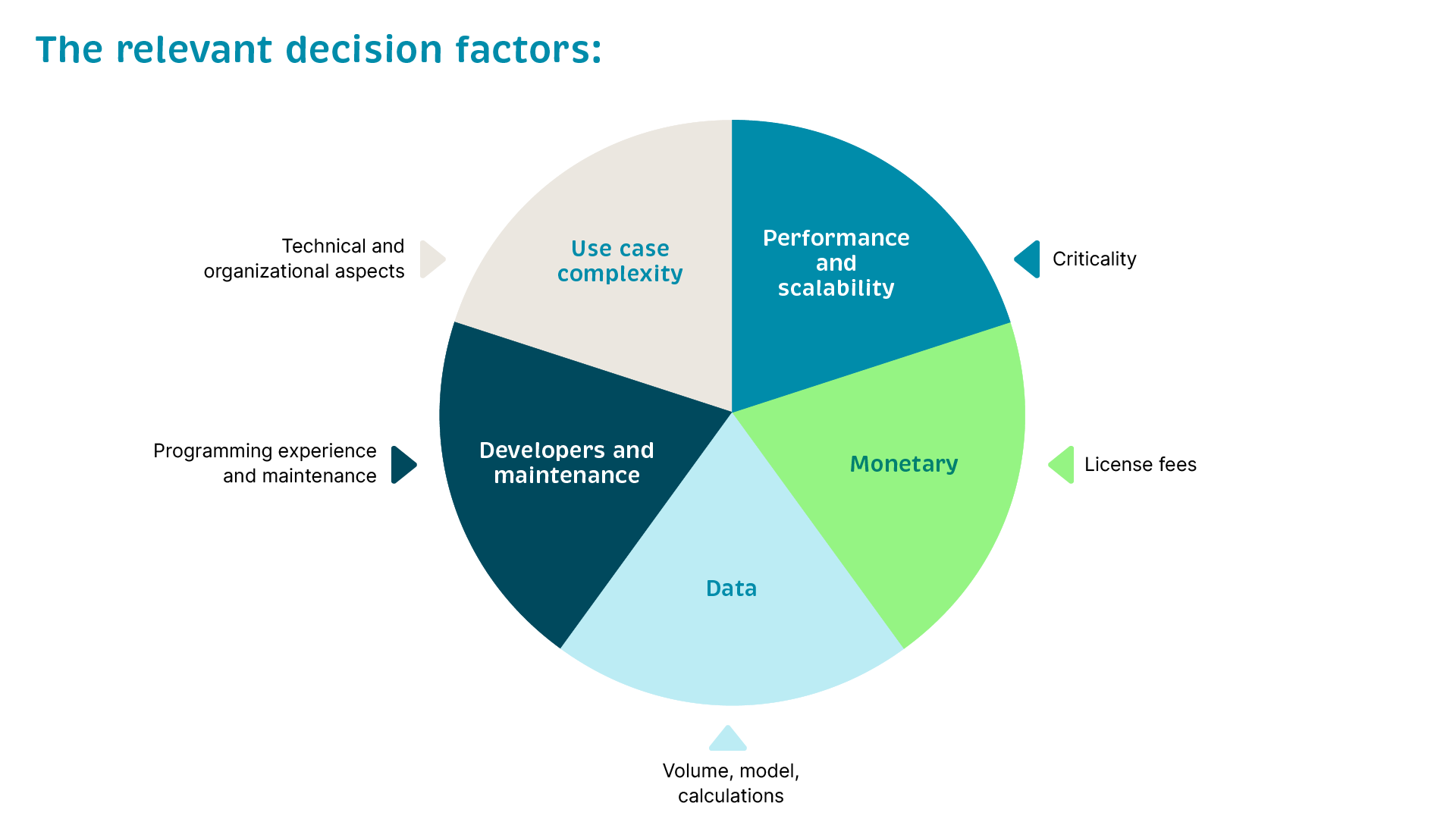C = 01000011; O = 01101111; D = 01100100; E = 01100101 - this is the binary representation of the word "code". But there is much more to coding than the skillful stringing together of zeros and ones. In today's business world, the effective use of coding technologies is important for companies to remain competitive. Low-code platforms offer a promising way to develop applications without requiring in-depth programming skills. However, despite the benefits of low-code platforms, existing literature and practice also highlight their limitations. Against this backdrop, we investigated which decision criteria are relevant for the successful development of enterprise applications using low-code or high-code.
Our study was conducted as part of an industry dissertation on the topic of the digital workplace in cooperation with the Technical University of Darmstadt. We identified decision relevant criteria for or against the use of low-code, which can be used as a guideline for a planned use case.
A quick overview: Why organizations should make the right choice
Since both low-code and high-code have their own advantages and disadvantages, it is becoming increasingly important for organizations to make an informed decision between these options to ensure effective results. An ill-considered choice of low-code can lead to the realization during application development that high-code is required, which can result in a complex transition. As a result, low-code is only appropriate for certain use cases. However, organizations should not always prefer high-code, as low-code offers advantages such as easier maintenance and customization by non-programmers.
Focus topic: Choosing between low-code and high-code
High-code programming, also known as traditional text-based programming, is typically done using programming languages such as C, C++, Python, or Java (Novales and Mancha 2023). This type of programming requires extensive technical skills and the handling of many lines of code.
Low-code is a hot topic in both academia and industry. This form of programming is characterized by the use of drag-and-drop in an interactive graphical user interface. This allows employees without extensive programming skills (citizen developers), even outside IT departments, to create applications. As "non-IT professionals" within organizations, these individuals can design, develop, and deploy lightweight digital solutions. In some cases, however, at least some basic technical understanding is required. In recent years, the demand and application areas for low-code have grown steadily, including database applications, mobile applications, application processing, and IoT.

What are the decision factors?
Several factors can be used to make a well-founded and transparent decision between low-code and high-code. The following factors were collected in a study by Campana & Schott and TU Darmstadt.
1. Use case complexity
The complexity of the use case is the most relevant decision criterion between low-code and high-code. Both the technical and the organizational side should be considered. Technically, a high complexity of the user interface or a desired offline functionality may argue against the use of low-code. If the application is to reflect exact design specifications, it is advisable to design the front-end with high code, since low-code means being restricted to the design elements of the platform provider. On the business side, the degree of precision of the application to be implemented at the start of the project is important. The better the required functionality is known in advance, the more likely it is that low-code can be used. The feasibility of the technical requirements on the low-code platform is a prerequisite and should be checked beforehand. In addition, a complex assignment of rights within the application due to different role profiles is difficult to implement with low-code.
2. Developer community and maintenance
The decision to use low-code depends on the programming experience of the developers. If there is little experience, low-code provides a starting point and facilitates application development. At the same time, the people responsible for maintenance should be identified. If the application to be developed is not maintained by the IT department, the idea of using low-code is worthwhile, as low-code allows maintenance and small changes to be made with just a few lines of code.
3. Data: volume, model, calculations
A high volume of data to be processed from the start of the project, or the expectation of a sharp increase in the volume of data, speaks in favor of high-code development. The number of integrated entity types should also not be too large if low-code is to be used. The complexity of the calculations on the data should also be taken into account. Complicated calculations are usually better implemented in high-code.
4. Performance and scalability
If the planned applications are to meet high performance and scalability requirements, it is advisable to use high-code. Low-code makes sense if the application is to be used for a pre-defined case and does not contain any highly time-critical functionality.
5. Monetary aspects
On the monetary side, low-code platforms are usually based on a licensing model that requires a paid license for each developer and/or user. If these costs are difficult to calculate in advance, the use of high-code should be considered.
The criteria presented here can be consulted when planning a project. If you would like advice on your specific project, Campana & Schott will be happy to help.
How Campana & Schott supports you in the realization of your business project and the development of applications
As a technology and management consultancy, we support you in realizing your visions. We are happy to support you in the implementation of your project with our low-code and high-code expertise and many years of project experience.
Would you like to know more or do you need specific support?

